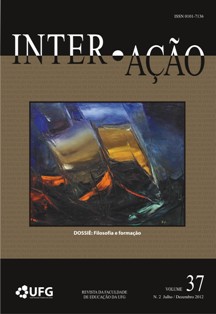SABERES DOCENTES NO PROJETO FORMATIVO DO ENGENHEIRO AGRÔNOMO NO CURSO DE AGRONOMIA DA UFC EM FORTALEZA
DOI:
https://doi.org/10.5216/ia.v37i2.13514Palavras-chave:
Saberes agronômicos. Formação do agrônomo, Tendência tecnicista, ProfissionalidadeResumo
Este trabalho tem como objetivo investigar os saberes docentes praticados no projeto formativo do curso de Agronomia da UFC. O estudo teve como motivação a oportunidade de penetrar em um ambiente profissional pouco explorado, a formação acadêmica. Para tanto, foi realizada uma pesquisa qualitativa, delineada no estudo de caso, com abordagem descritiva, utilizando o instrumento de entrevista semiestruturada. Da conclusão, destacam-se a formação influenciada pela tendência tecnicista e que o projeto formativo não possibilita a profissionalidade necessária para atender aos desafios e demandas atuais e emergentes do meio rural, segundo 81% dos entrevistados.Downloads
Downloads
Publicado
Como Citar
Edição
Seção
Licença
A Inter-Ação utiliza como base para transferência de direitos a licença Creative Commons Attribution 4.0 para periódicos de acesso aberto (Open Archives Iniciative - OAI). Por acesso aberto entende-se a disponibilização gratuita na Internet, para que os usuários possam ler, baixar, copiar, distribuir, imprimir, pesquisar ou referenciar o texto integral dos documentos, processá-los para indexação, utilizá-los como dados de entrada de programas para softwares, ou usá-los para qualquer outro propósito legal, sem barreira financeira, legal ou técnica.
Autores que publicam neste periódico concordam com os seguintes termos:
1) Autores mantém os direitos autorais e concedem à revista o direito de primeira publicação, com o trabalho simultaneamente licenciado sob a Licença Creative Commons Attribution que permite o compartilhamento do trabalho com reconhecimento da autoria e publicação inicial nesta revista.
2) Autores têm autorização para assumir contratos adicionais separadamente, para distribuição não-exclusiva da versão do trabalho publicada nesta revista (ex.: publicar em repositório institucional ou como capítulo de livro), com reconhecimento de autoria e publicação inicial nesta revista.
3) Autores têm permissão e são estimulados a publicar e distribuir seu trabalho online (ex.: em repositórios institucionais ou na sua página pessoal) a qualquer ponto antes ou durante o processo editorial, já que isso pode gerar alterações produtivas, bem como aumentar o impacto e a citação do trabalho publicado.















